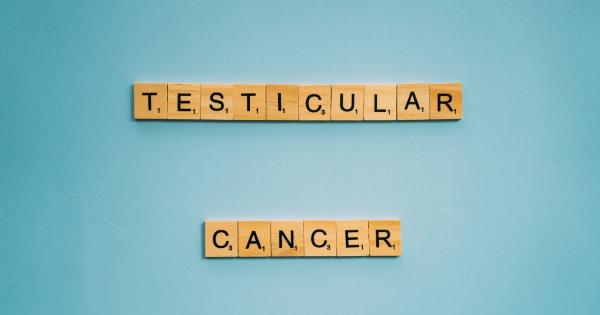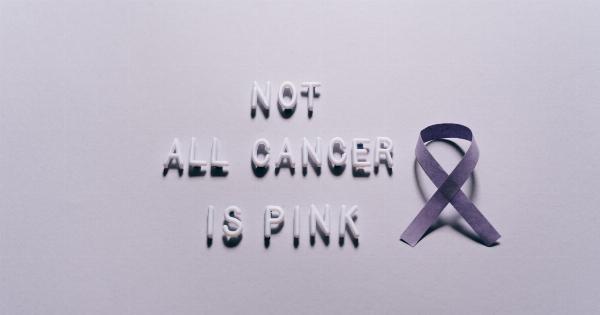Testicular cancer is a type of cancer that affects the testicles, which are the male reproductive organs responsible for producing sperm and testosterone.
It is a relatively rare form of cancer, but it is most commonly diagnosed in men between the ages of 15 and 35. Like other types of cancer, early detection and treatment are crucial for a successful outcome. Knowing the symptoms of testicular cancer and being aware of what to look out for can greatly increase the chances of catching it in its early stages.
1. Lump or Enlargement in the Testicle
One of the most common signs of testicular cancer is a lump or enlargement in either of the testicles. While it’s normal for one testicle to be slightly larger or hang lower than the other, any notable changes should be checked by a doctor.
The lump may or may not be painful, and it can vary in size. It’s important to note that not all testicular lumps are cancerous, but it’s crucial to have them examined to rule out the possibility of cancer.
2. Testicular Pain or Discomfort
Persistent pain or discomfort in the testicles can be a symptom of testicular cancer. The pain may range from a dull ache to a sharp, stabbing sensation. Some men may also experience a feeling of heaviness or a dragging sensation in the scrotum.
If you notice any unusual or persistent pain in your testicles, it’s important to get it checked by a healthcare professional to determine the cause.
3. Swelling or Lumps in the Scrotum
In addition to the presence of a lump or enlargement in the testicle, testicular cancer can sometimes cause swelling or lumps in the scrotum. This may be accompanied by a feeling of pressure or fullness in the scrotal area.
If you observe any changes in the size or shape of your scrotum, it’s essential to have it evaluated by a healthcare provider.
4. Changes in Testicular Texture or Consistency
Another symptom of testicular cancer is a change in the texture or consistency of the testicles. They may become hard or feel lumpy, which is different from the usual smoothness.
It’s crucial to become familiar with the normal texture of your testicles so that you can identify any abnormal changes. If you notice any unusual textures or irregularities, seek medical attention promptly.
5. Testicular Sensitivity or Painful Sensation
Some men with testicular cancer may experience increased sensitivity or a painful sensation in the testicles. This sensitivity may be more prominent during physical activities, such as exercising, or even with light touch.
If you find that your testicles are unusually sensitive or if they become painful to the touch, consult a healthcare professional for further evaluation.
6. Breast Growth or Tenderness
In certain cases, testicular cancer can lead to hormonal changes that cause breast growth (gynecomastia) or tenderness in men. If you notice any unexpected breast growth or tenderness, it is essential to discuss it with a healthcare provider.
While breast growth can have numerous causes, it can also be a symptom of testicular cancer.
7. Lower Back Pain or Abdominal Pain
In some instances, testicular cancer can cause lower back pain or abdominal pain. The pain may be persistent or intermittent and can range from mild to severe.
It’s important to note that lower back pain and abdominal pain are common symptoms that can be caused by various conditions, but if you experience these symptoms alongside other testicular cancer symptoms, it is important to consult a healthcare professional for a proper evaluation.
8. Fatigue and Generalized Weakness
Persistent fatigue and weakness that are not related to any specific causes, such as lack of sleep or overexertion, can be symptoms of testicular cancer.
Cancer cells can disrupt the body’s normal processes, leading to feelings of tiredness and weakness. If you experience prolonged fatigue and weakness along with other symptoms, it’s essential to seek medical advice.
9. Fluid Accumulation in the Scrotum
In some cases, testicular cancer can cause the buildup of fluid in the scrotum, resulting in swelling. This condition is known as hydrocele and can cause discomfort or a sense of heaviness.
If you notice unexplained swelling or changes in the size and shape of your scrotum, it is crucial to consult a healthcare professional for an accurate diagnosis.
10. General Symptoms
Aside from the specific symptoms mentioned above, testicular cancer can also exhibit general symptoms that are common to various types of cancer. These include unexplained weight loss, night sweats, and a persistent feeling of fatigue.
If you experience any of these general symptoms alongside the previously mentioned testicular symptoms, it’s advisable to consult a healthcare professional for further evaluation.
Conclusion
Being aware of the symptoms of testicular cancer is essential for early detection and effective treatment.
If you notice any changes or abnormalities in your testicles or experience any of the symptoms mentioned above, it’s crucial to seek medical attention promptly. Remember, not all symptoms are indicative of testicular cancer, but it’s always better to be safe than sorry when it comes to your health.


























